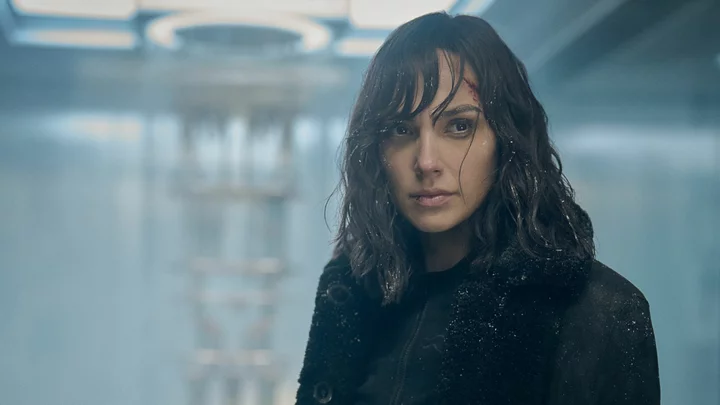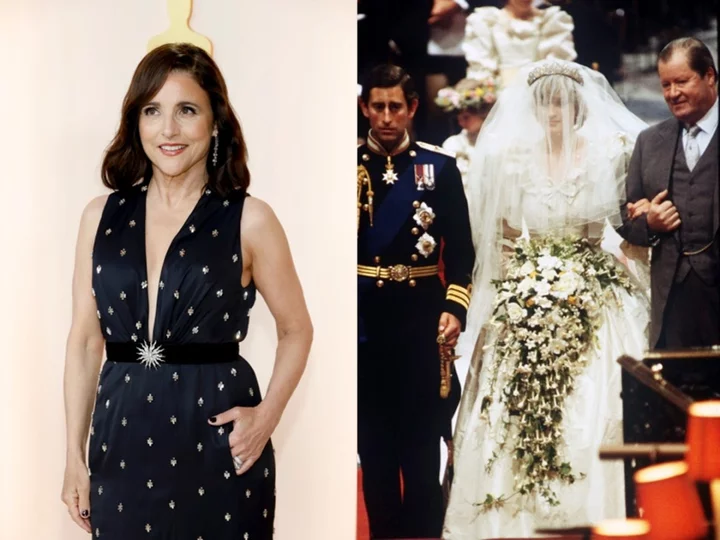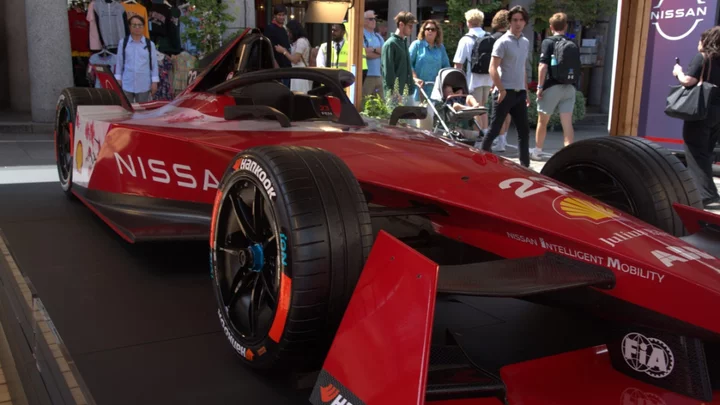There's precisely one inventive, original action beat in Tom Harper's Heart of Stone, involving two bikes and a garbage truck on an Icelandic mountainside. It whizzes by so quickly, and with such haphazard framing and assembly, that its impact barely registers. Unfortunately, this is indicative of the rest of the movie, which is the latest in a line of potential action franchise-starters from Netflix that feels dead on arrival. Similar to The Gray Man and Red Notice, Heart of Stone cobbles together scenes and ideas from far superior films.
On one hand, Heart of Stone has the misfortune of sharing major plot similarities with the rollicking Mission: Impossible - Dead Reckoning Part One, which hit cinemas less than two months ago. On the other hand, it also feels like an intentional attempt to ape the magic of earlier Mission: Impossible films, only it lacks the necessary sleight of hand. Worst of all, its sprawling ensemble — led by Wonder Woman actress Gal Gadot, Fifty Shades front man Jamie Dornan, and Bollywood superstar Alia Bhatt — ends up a charisma black hole. This is partially owed to the sheer lack of material they're offered by the script, but the problems at the heart of this flimsy action knock-off are multifaceted and run bone deep.
What is Heart of Stone about?
Opening with a covert MI6 mission in the Alps — run by field agents Parker (Dornan) and Yang (Jing Lusi), and techies Bailey (Paul Ready) and Rachel Stone (Gadot) — Heart of Stone is quick to reveal its premise. The plan goes awry, forcing analyst Stone to jump into action despite her lack of training. But unbeknownst to her teammates, she's a guardian angel of sorts, a super-skilled agent working for an even more secret spy outfit known as the Charter. With the help of a powerful AI "big brother" software known as the Heart, which collates information at light speed and calculates optimal outcomes, Stone helps her MI6 cohorts, who are none the wiser.
It's a fun opening sequence that allows the viewer to piece together the basics, even if its propulsive Steven Price score is never quite matched by equally propulsive images. The frame, for the most part, is composed of noncommittal medium shots with a camera that barely moves to capture a sense of momentum. There are a handful of exceptions, though. As Stone skis down a mountainside, the Charter tech expert dubbed "Jack of Hearts" (Matthias Schweighöfer) in her ear, the AI's calculations allow the screen to briefly take on the appearance of a first-person action video game, lit-up route guides, stat meters, and all. This is the last time the movie feels in any way immersive.
It also turns out that a powerful Indian hacker, Keya Dhawan (Bhatt), is out to infiltrate and possibly steal the Heart for reasons yet unknown, prompting both Stone's MI6 team and her bosses at the Charter to begin a global cat-and-mouse chase that takes them to Portugal and beyond. As Stone struggles to maintain her Russian nesting doll of covers — she's a secret agent who's secretly an even more secret agent, a potentially fun idea that soon falls by the wayside — she also seems initially torn between the Heart's cold calculations on how to "optimize" her missions and her own personal allegiance to Parker, Yang and Bailey, whose safety matters to her, even if it isn't her duty. This, too, is a potent idea quickly swept under the rug after being brought up just once.
Before long, it becomes clear that Heart of Stone has little interest in exploring the highly relevant setup of pitting human beings against a supposedly objective algorithm, despite skimming the surface of this idea. In fact, the Heart is never actually wrong about anything in the film. Its instructions lead to almost no moral dilemmas, while Stone's subjective mistakes end up costing her team. Even the stakes of the AI falling into the wrong hands are never quite expressed dramatically, through action or depiction — think the opening of Dead Reckoning, when the AI suddenly takes control of a submarine. Rather, these dangers simply speculated on through dialogue, leading to a distinct lack of urgency plaguing the entire film.
Were this its only major flaw, Heart of Stone might have at least stood a chance at establishing itself as the birth of a brand-new series. However, the failure of the movie's "what" pales in comparison to the failure of its "who" and "why."
Who are Rachel Stone and the other characters?
Credit: Robert Viglasky/NetflixHeart of Stone is a strange title, given the end product; ironically, it feels AI-generated. "Heart" is a reference to both the highly intelligent spy tech the Charter uses, as well as the covert outfit itself. (Stone's designation is the Nine of Hearts; other spies have other card-based code names as well, like the aforementioned Jack of Hearts.) But Stone's heart is never really at the movie's core, beyond one fleeting reference to her proclivity for saving her teammates. It's a mirror to the dilemmas faced by Tom Cruise's Ethan Hunt throughout numerous Mission: Impossible entries. But where this emotional driving force has informed many of Hunt's missions, it never comes up beyond the first act of Heart of Stone.
So, who exactly is Rachel Stone? It turns out she's someone who makes snappy quips without the charisma to back them up. While her spine is that of a hero who wants to do the nebulous "right thing," this outlook is never really challenged or thrown into disarray.
Bhatt's villainous Dhawan, meanwhile, exists at the opposite end of the spectrum. Little is known about either leading woman beyond their immediate interactions with those around them, but even with the broad details of Dhawan's difficult childhood sketched out, it's hard to get a read on her motives or moral boundaries, which eventually form the basis of the movie's third-act tensions.
None of this is helped by the fact that both Gadot and Bhatt are actresses who only perform well within extremely narrow confines. Here, they are tasked with delivering exceptionally stiff dialogue. Part of the problem is that writer Greg Rucka leans heavily on exposition; his script for the Netflix film The Old Guard, which was based on his graphic novel, had similarly awkward line readings. The other part is a common Hollywood problem: favoring American English in speech, with frequent American idioms, even when the characters aren’t American — like agent Rachel Stone.
When these characters are also played by international stars, such lines get lost in translation. (Rucka and co-screenwriter Allison Schroeder are both American, so who's to say if they noticed anything was amiss.) It all feels a bit uncanny, like both characters are simply lumbering their way through things that must be said in order to progress the plot, but things that also leave too many moments of dead air when nearly every quip and punchline fails to land.
Stone does, at least, have a sweet dynamic with one member of her team, but it isn't the one the movie wants you to follow. As the conventionally attractive leads, Dornan and Gadot engage in scenes meant to highlight some sort of lingering, unspoken chemistry between Parker and Stone, though neither one manages to throw so much a longing glance the other's way.
It's one of the un-sexiest Hollywood films featuring attractive leads trying to perform mutual desire. However, there does exist one truly alluring dynamic, between Stone and the idiosyncratic, rough-around-the-edges Bailey. They share a sweet and platonic intimacy that borders on romantic at times, given how the two MI6 techies seem to understand each other and instantly get along. But the film never uses this as a complication in its lifeless Parker-Stone dynamic. It also fails to recognize that the confident, fast-talking Yang, who has a fun streak of her own, is arguably the most charismatic presence in the film. Demanding a different (albeit superior-sounding) movie is, unfortunately, wishful thinking.
There are other supporting characters who crop up at times, between established character actors as the various heads (or "Kings") of the Charter, but they're given very little screen time. Even more fleeting are the strange inclusions of other spies with their own card designations and other supporting players who seem to share a history with Stone. These characters show up quite literally for one or two shots each to exchange a word or two with her during missions before disappearing.
Perhaps they're meant to flesh out the boundaries of Stone's world, but they feel like afterthoughts at best, introduced as if to set up spin-offs but hastily truncated in the edit.
Heart of Stone's action is half-baked.
Credit: Robert Viglasky/NetflixPerhaps the worst thing you can say about an action movie is that it's boring and visually unpleasant. Nothing in Heart of Stone draws the eye — nothing you can see, anyway; much of its combat is obscured by shadow — and none of its action makes an impact. Stone's hidden skills are meant to elevate her above more run-of-the-mill spies, who gawk slack-jawed at her hyper-capability. But no action she performs, and no decision she makes, feels any different from what the other MI6 agents do.
The choreography never affords Gadot and her stuntwomen anything fun or unique. But even the movie's more standard and familiar action beats are strung together with such strange attention to detail and rhythm that it's hard not to wonder if the editors were even handed complete footage.
At one point, when Stone leaps off a cliff to escape Dhawan's henchmen — one of the only chases that doesn't end abruptly because the villains just decided to give up — the actual jump is obscured by a cut to an off-kilter, low-angle shot of Gadot. Backgrounded only by the clear blue sky, it has no sense of movement or scale, and it quickly cuts all the way out to a shot so wide that it features the same problem for the opposite reason. You either don't see enough, or you see so much that the details are completely lost.
This is especially unhelpful when the film re-creates the famous HALO jump from Mission: Impossible – Fallout, which Tom Cruise performed for real. In Heart of Stone, this scene is defined by its cartoonish lack of physical reality, and a camera that seldom captures a scale or perspective, even as characters plummet towards it out of the sky. It's hard to make death-defying action beats this boring, but somehow, Harper and cinematographer George Steel succeed.
A film that's disconnected and unimaginative on every front, Heart of Stone is one of the most banal action movies from a Hollywood studio this year. Practically nothing about it works, from its stunts, to its characters, to its familiar plot — a combination made worse by the fact that it's trying to ape far more fun and technically proficient action tentpoles from recent years. It's a losing strategy Netflix can't seem to shake.









